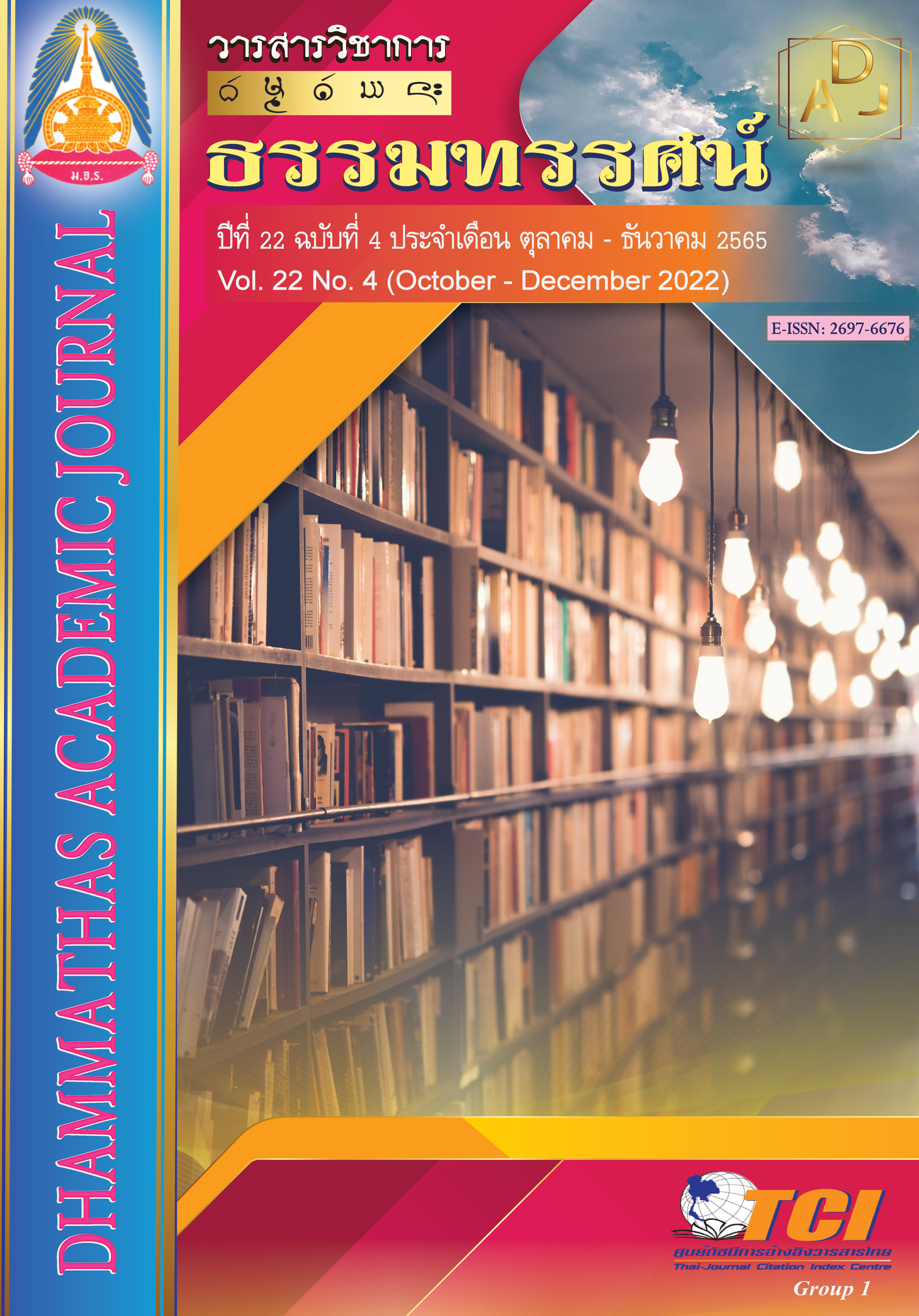The Model of Academic Management According to the Iddhibada 4 Principles in Secondary Schools Under the Office of the Secondary Education Service Area 10
Main Article Content
Abstract
The objectives of this research were: 1) to study the condition of academic administration, 2) to develop a model for academic management according to the Iddhibada 4 Principles, and 3) to propose a model of academic management according to the Iddhibada 4 Principles, using mixed method research. A questionnaire was used, a sample of 341 people, data were analyzed by statistical means, percentage, and standard deviation. The model was developed by interviewing 10 key informants and focus group discussions with 10 experts. Data were analyzed by content analysis.
The results showed that:
1. Conditions of Academic Administration in Secondary Schools under the office of the Secondary Educational Service Area Office, Region 10, as a whole, was at a high level. In descending order, they are Assessment and Evaluation and the transfer of academic results development and use of technological media for education development of learning process Educational curriculum development and internal quality assurance and educational standards.
2. Develop a model based on interview results, draft a model (1st draft), and hold a focus group. To improve the model of academic administration (2nd draft).
3. The model were 4 components: Part 1 Leading part, which are 1) environment 2) principles of academic management 3) objectives of academic management. Part 2 The model, which are 1) scope of academic management, the Iddhibada 4 Principles and project to develop academic management according to the Iddhibada 4 Principles 2) academic management process. Part 3 Implementation process, which are 1) structure 2) decision making 3) evaluation guidelines, and Part 4 conditions for success.
Article Details

This work is licensed under a Creative Commons Attribution-NonCommercial-NoDerivatives 4.0 International License.
เพื่อให้เป็นไปตามกฎหมายลิขสิทธิ์ ผู้นิพนธ์ทุกท่านต้องลงลายมือชื่อในแบบฟอร์มใบมอบลิขสิทธิ์บทความ ให้แก่วารสารฯ พร้อมกับบทความต้นฉบับที่ได้แก้ไขครั้งสุดท้าย นอกจากนี้ ผู้นิพนธ์ทุกท่านต้องยืนยันว่าบทความ ต้นฉบับที่ส่งมาตีพิมพ์นั้น ได้ส่งมาตีพิมพ์เฉพาะในวารสาร วิชาการธรรม ทรรศน์ เพียงแห่งเดียวเท่านั้น หากมีการใช้ ภาพหรือตารางของผู้นิพนธ์อื่นที่ปรากฏในสิ่งตีพิมพ์อื่นมาแล้ว ผู้นิพนธ์ต้องขออนุญาตเจ้าของลิขสิทธิ์ก่อน พร้อมทั้ง แสดงหนังสือที่ได้รับการยินยอมต่อบรรณาธิการ ก่อนที่บทความจะได้รับการตีพิมพ์References
กระทรวงสาธารณสุข. (2563). คู่มือการปฏิบัติสำหรับสถานศึกษา ในการป้องกันการแพร่ระบาดของโรคโควิด 19. นนทบุรี: คิว แอดเวอร์ไทซิ่ง.
ชลิดา เจริญชัย. (2561). ปัญหาและแนวทางการพัฒนาการบริหารงานวิชาการโรงเรียนกลุ่มนิคมพัฒนา สังกัดสำนักงานเขตพื้นที่การศึกษาประถมศึกษาระยอง เขต 1. (วิทยานิพนธ์ศึกษาศาสตรมหาบัณฑิต). ชลบุรี: มหาวิทยาลัยบูรพา.
ดาราวรรณ ศรีกาญจนา. (2561). รูปแบบการพัฒนาภาวะผู้นำทางวิชาการตามหลักพุทธธรรมสำหรับผู้บริหารสถานศึกษามัธยมศึกษา สังกัดกรุงเทพมหานคร. (วิทยานิพนธ์พุทธศาสตรดุษฎีบัณฑิต). พระนครศรีอยุธยา: มหาวิทยาลัยมหาจุฬาลงกรณราชวิทยาลัย.
ธานินทร์ ศิลป์จารุ. (2552). การวิจัยและวิเคราะห์ข้อมูลทางสถิติด้วย SPSS. (พิมพ์ครั้งที่ 10). กรุงเทพฯ: บิสซิเนสอาร์แอนด์ดี.
พนม วิลัยหล้า. (2560). สภาพปัญหาและแนวทางการพัฒนาการบริหารงานวิชาการของโรงเรียนในสังกัดสำนักงานเขตพื้นที่การศึกษามัธยมศึกษา เขต 27. (วิทยานิพนธ์การศึกษามหาบัณฑิต). มหาสารคาม: มหาวิทยาลัยมหาสารคาม.
พระอภินันท์ กนฺตสีโล (สิงมาดา). (2563). การบริหารสถานศึกษาตามหลักอิทธิบาท 4 ในสถานศึกษาขั้นพื้นฐานอำเภอนาดูน สังกัดสำนักงานเขตพื้นที่การศึกษาประถมศึกษามหาสารคาม เขต 2. Journal of Modern Learning Development, 5(4), 62-70.
มณสินี เจริญไชยนาวงศ์ และปทุมพร เปียถนอม. (2563). การบริหารงานวิชาการของผู้บริหารสถานศึกษาโรงเรียน สังกัดสำนักงานเขตบางกอกน้อย กรุงเทพมหานคร. วารสารวิชาการมหาวิทยาลัยราชภัฏศรีสะเกษ, 14(2), 72-82.
สัมมา รธนิธย์. (2560). หลักทฤษฎีและปฏิบัติการบริหารการศึกษา. (พิมพ์ครั้งที่ 4). กรุงเทพฯ: พิมพ์ดี.
สารินทร์ เอี่ยมครอง. (2561). แนวทางการบริหารงานวิชาการของสถานศึกษาในจังหวัดชัยนาท สังกัดสำนักงานเขตพื้นที่การศึกษามัธยมศึกษา เขต 5. (วิทยานิพนธ์ครุศาสตรมหาบัณฑิต). นครสวรรค์: มหาวิทยาลัยราชภัฏนครสวรรค์.
สำนักงานคณะกรรมการขั้นพื้นฐาน. (2561). แผนยุทธศาสตร์เพื่อพัฒนาคุณภาพโรงเรียนขนาดเล็กปี 2561 ถึง 2563. กรุงเทพฯ: ชุมนุมสหกรณ์การเกษตรแห่งประเทศไทย.
สิน งามประโคน และคณะ. (2562). การบริหารการศึกษา: แนวคิด ทฤษฎีและรูปแบบการบริหารจัดการ. วารสารครุศาสตร์ปริทรรศน์ คณะครุศาสตร์ มหาวิทยาลัยมหาจุฬาลงกรณราชวิทยาลัย, 6(3), 134-146.
อดิพงษ์ สุขนาค. (2560). การสังเคราะห์รูปแบบความสัมพันธ์เชิงเส้นขององค์ประกอบเชิงสาเหตุที่ส่งผลต่อประสิทธิภาพการบริหารงานวิชาการของโรงเรียนมัธยมศึกษาขนาดใหญ่ สังกัดสำนักงานคณะกรรมการการศึกษาขั้นพื้นฐาน. (วิทยานิพนธ์ศึกษาศาสตรดุษฎีบัณฑิต). ชลบุรี: มหาวิทยาลัยบูรพา.

